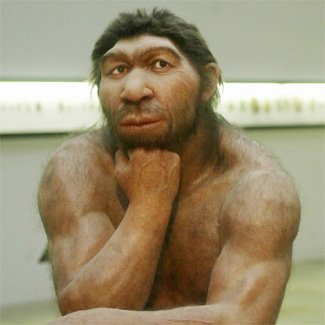
Professor George Church, a leading geneticist, is on the hunt for an “adventurous woman” to help turn back the hands of time – and give birth to a Neanderthal baby.
George Church, a genetics professor at Harvard Medical School, believes he can bring back the extinct ancestor of modern man after more than 33,000 years.
Contrary to popular belief, Neanderthals were in fact a highly intelligent race and Prof. George Church believes they could be recreated through modern medicine.
Prof. George Church, 58, told German magazine, Der Spiegel: “I have already managed to attract enough DNA from fossil bones to reconstruct the DNA of the human species largely extinct. Now I need an adventurous female human.
“It depends on a lot of things, but I think it can be done. The reason I would consider it a possibility is that a bunch of technologies are developing faster than ever before.
“In particular, reading and writing DNA is now about a million times faster than seven or eight years ago.
“Another technology that the de-extinction of a Neanderthal would require is human cloning.
“We can clone all kinds of mammals, so it’s very likely that we could clone a human. Why shouldn’t we be able to do so?”

Prof. George Church is a pioneer in synthetic biology, which aims is to create synthetic DNA and organisms in the laboratory.
During the 1980s, he helped initiate the Human Genome Project that created a map of the human genome.
George Church admits his project may have shades of Frankenstein about it, but he believes recreating Neanderthals would benefit mankind.
He added: “Neanderthals might think differently than we do. We know that they had a larger cranial size. They could even be more intelligent than us.
“When the time comes to deal with an epidemic or getting off the planet or whatever, it’s conceivable that their way of thinking could be beneficial.
“They could maybe even create a new neo-Neanderthal culture and become a political force. The main goal is to increase diversity. The one thing that is bad for society is low diversity.
‘This is true for culture or evolution, for species and also for whole societies. If you become a monoculture, you are at great risk of perishing.
“Therefore the recreation of Neanderthals would be mainly a question of societal risk avoidance.”
He also explains how the process could theoretically be carried out.
“The first thing you have to do is to sequence the Neanderthal genome, and that has actually been done.
“The next step would be to chop this genome up into, say, 10,000 chunks and then synthesize these. Finally, you would introduce these chunks into a human stem cell.
“If we do that often enough, then we would generate a stem cell line that would get closer and closer to the corresponding sequence of the Neanderthal.
“We developed the semi-automated procedure required to do that in my lab.
“Finally, we assemble all the chunks in a human stem cell, which would enable you to finally create a Neanderthal clone.”
The missing puzzle in his plan is a surrogate mother for the project, who would be a human female.
According to experts, Prof. George Church’s plan is technically possible.
Many of his suggestions formed the central plot-line of the 1993 Steven Spielberg film Jurassic Park, in which dinosaur DNA that had been embedded in chunks of amber was extracted to recreate the monsters that once dominated Earth.
Neanderthals are named after the site in the Neander Valley, Germany, where archaeologists first discovered the species in 1856 – three years before Charles Darwin published his On The Origin Of Species.